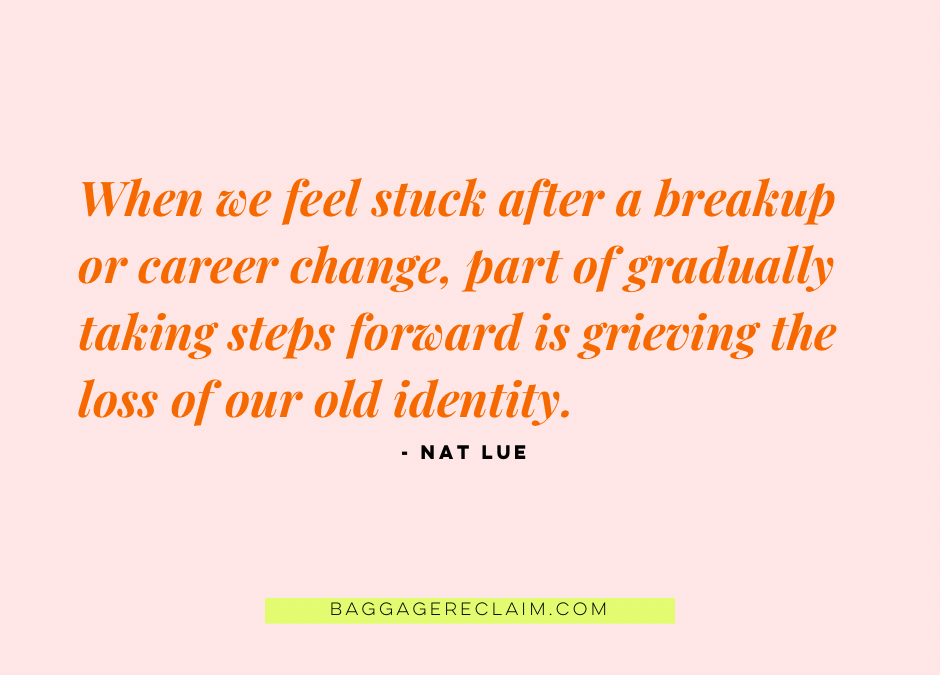When a significant relationship ends, or even when you step away from a job or career that you thought was ‘it’, you grieve the loss. Even though you may be aware that the relationship/marriage/job/career wasn’t working and all of the reasons why, you can still wind up feeling mad at yourself for not still:
- being in a relationship
- being married
- hustling or coasting in the job or career
In essence, you’re mad at yourself for not being your ideal(ised) self: the version of yourself that you think you’re supposed to be that likely ticks society’s boxes.
Your grief, on some level, is about failure to be perfect.
Your self-worth may be tied up in, for instance, being married. Or maybe your identity is based on your career and achievements.This grief and, yes, shame can cause you to feel stuck.
Particularly when it’s been a painful or frustrating relationship/situation, you might be entrenched in the role of Victim. Don’t fret! We all do it at different times and for different things. That doesn’t mean that we haven’t been a victim, incidentally. Sometimes, though, it becomes our identity, essentially disempowering us.
Let’s say you’ve been in an unfulfilling/unhealthy relationship where you essentially received less than love, care, trust and respect. If you move on with your life, your ex can’t be the Shit. You can’t continue to feel victimised by your ex. Moving forward will also mean you’re no longer waiting for them to validate that you’re a Good Person.
Let’s go a layer deeper. Let’s say that you also have a role in your family. Maybe you’re the Outsider, the One Who Mustn’t Do Too Well, the Something. On some level, moving forward and bettering your life, even though you want to do it, may feel disloyal and scary. By, for example, being okay with being single and enjoying your life, these choices contradict and cancel your roles.
Shame creates stuckness.
Even though we may have a strong awareness of why the relationship or situation didn’t work, we often judge ourselves based on something that distorts our perception and ability to move forward. For example, let’s say we were unhappily married and were mistreated but our ex has moved on. Then it becomes, Well, there must be something wrong with me if [my ex] is snapped up and happy in another relationship. We also judge where we are. This isn’t where I thought my life would be.
To be clear, your ex moving on isn’t a sign that there’s something wrong with you. There are all sorts of factors at play. For instance, if they haven’t internalised the breakup the way you have, their sense of self isn’t distorted. We also live in a society where, in hetero relationships, men tend to land on their feet. There’s societal conditioning that’s still in play where what one woman won’t put up with, another will. In all types of relationships, many humans “move on” super quickly so that they don’t have to process.
Generally speaking, long-term unhealthy relationships come to an end rather than experiencing a come-to-Jesus moment. And that’s the right outcome.
Suffering together is how things used to be done.
It’s worth considering where you got the idea that the outcome should be different. It’s highly likely that what you’ve internalised about how relationships, jobs and careers ‘should’ be dates back to early childhood. Your idea of what’s possible for you and what you must “put up with” is likely outdated. Check out my podcast episode on exploring the baggage behind our stuckness.
Be careful of wishing you were in a relationship that wasn’t right for you just so that you wouldn’t have to be where you are right now.
Wishing you were still in a painful, incompatible relationship is like saying that the outcome was wrong. This thinking and attitude mean that another relationship and other situations will cause you to deal with the same issues: accepting when something isn’t working and learning to be okay with being you, even if that means, for instance, being single or having to find your way in a new career at an age you didn’t expect to be.
The Joy of Saying No: A Simple Plan to Stop People Pleasing, Reclaim Boundaries, and Say Yes to the Life You Want (Harper Horizon/HarperCollins) is out now and available in bookshops on and offline. Listen to the first chapter.

 Add to favorites
Add to favorites 
